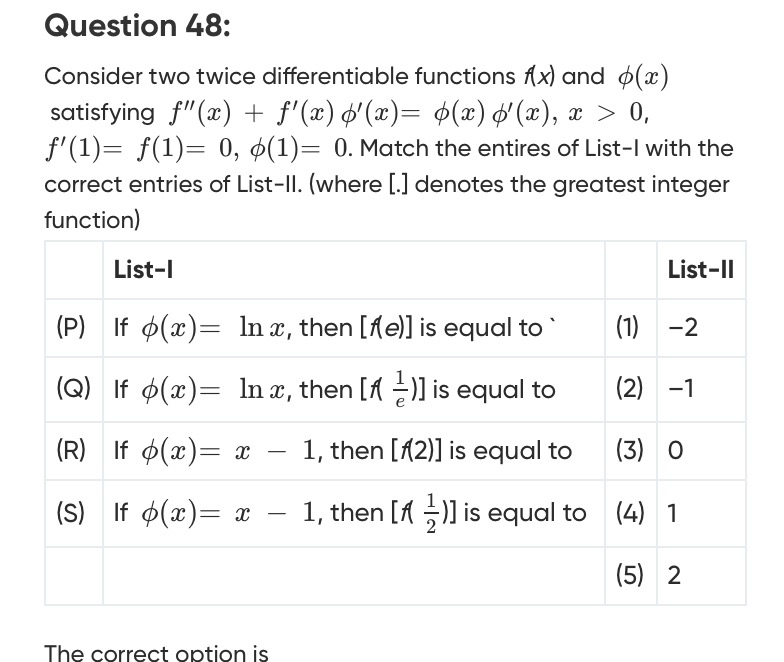Question
Question: Consider two twice differentiable functions $f(x)$ and $\phi(x)$ satisfying $f''(x) + f'(x)\phi'(x) ...
Consider two twice differentiable functions f(x) and ϕ(x) satisfying f′′(x)+f′(x)ϕ′(x)=ϕ(x)ϕ′(x),x>0,f′(1)=f(1)=0,ϕ(1)=0. Match the entires of List-I with the correct entries of List-II. (where [.] denotes the greatest integer function)

If ϕ(x)=lnx, then [f(e)] is equal to
If ϕ(x)=lnx, then [f(e1)] is equal to
If ϕ(x)=x−1, then [f(2)] is equal to
If ϕ(x)=x−1, then [f(21)] is equal to
If ϕ(x)=lnx, then [f(e)] is equal to
If ϕ(x)=lnx, then [f(e1)] is equal to
If ϕ(x)=x−1, then [f(2)] is equal to
If ϕ(x)=x−1, then [f(21)] is equal to
If ϕ(x)=lnx, then [f(e)] is equal to
If ϕ(x)=lnx, then [f(e1)] is equal to
If ϕ(x)=x−1, then [f(2)] is equal to
If ϕ(x)=x−1, then [f(21)] is equal to
If ϕ(x)=lnx, then [f(e)] is equal to
If ϕ(x)=lnx, then [f(e1)] is equal to
If ϕ(x)=x−1, then [f(2)] is equal to
If ϕ(x)=x−1, then [f(21)] is equal to
If ϕ(x)=lnx, then [f(e)] is equal to
If ϕ(x)=lnx, then [f(e1)] is equal to
If ϕ(x)=x−1, then [f(2)] is equal to
If ϕ(x)=x−1, then [f(21)] is equal to
If ϕ(x)=lnx, then [f(e)] is equal to
If ϕ(x)=lnx, then [f(e1)] is equal to
If ϕ(x)=x−1, then [f(2)] is equal to
If ϕ(x)=x−1, then [f(21)] is equal to
If ϕ(x)=lnx, then [f(e)] is equal to
If ϕ(x)=lnx, then [f(e1)] is equal to
If ϕ(x)=x−1, then [f(2)] is equal to
If ϕ(x)=x−1, then [f(21)] is equal to
If ϕ(x)=lnx, then [f(e)] is equal to
If ϕ(x)=lnx, then [f(e1)] is equal to
If ϕ(x)=x−1, then [f(2)] is equal to
If ϕ(x)=x−1, then [f(21)] is equal to
If ϕ(x)=lnx, then [f(e)] is equal to
If ϕ(x)=lnx, then [f(e1)] is equal to
If ϕ(x)=x−1, then [f(2)] is equal to
If ϕ(x)=x−1, then [f(21)] is equal to
If ϕ(x)=lnx, then [f(e)] is equal to
If ϕ(x)=lnx, then [f(e1)] is equal to
If ϕ(x)=x−1, then [f(2)] is equal to
If ϕ(x)=x−1, then [f(21)] is equal to
If ϕ(x)=lnx, then [f(e)] is equal to
If ϕ(x)=lnx, then [f(e1)] is equal to
If ϕ(x)=x−1, then [f(2)] is equal to
If ϕ(x)=x−1, then [f(21)] is equal to
If ϕ(x)=lnx, then [f(e)] is equal to
If ϕ(x)=lnx, then [f(e1)] is equal to
If ϕ(x)=x−1, then [f(2)] is equal to
If ϕ(x)=x−1, then [f(21)] is equal to
If ϕ(x)=lnx, then [f(e)] is equal to
If ϕ(x)=lnx, then [f(e1)] is equal to
If ϕ(x)=x−1, then [f(2)] is equal to
If ϕ(x)=x−1, then [f(21)] is equal to
If ϕ(x)=lnx, then [f(e)] is equal to
If ϕ(x)=lnx, then [f(e1)] is equal to
If ϕ(x)=x−1, then [f(2)] is equal to
If ϕ(x)=x−1, then [f(21)] is equal to
If ϕ(x)=lnx, then [f(e)] is equal to
If ϕ(x)=lnx, then [f(e1)] is equal to
If ϕ(x)=x−1, then [f(2)] is equal to
If ϕ(x)=x−1, then [f(21)] is equal to
If ϕ(x)=lnx, then [f(e)] is equal to
If ϕ(x)=lnx, then [f(e1)] is equal to
If ϕ(x)=x−1, then [f(2)] is equal to
If ϕ(x)=x−1, then [f(21)] is equal to
If ϕ(x)=lnx, then [f(e)] is equal to
If ϕ(x)=lnx, then [f(e1)] is equal to
If ϕ(x)=x−1, then [f(2)] is equal to
If ϕ(x)=x−1, then [f(21)] is equal to
If ϕ(x)=lnx, then [f(e)] is equal to
If ϕ(x)=lnx, then [f(e1)] is equal to
If ϕ(x)=x−1, then [f(2)] is equal to
If ϕ(x)=x−1, then [f(21)] is equal to
If ϕ(x)=lnx, then [f(e)] is equal to
If ϕ(x)=lnx, then [f(e1)] is equal to
If ϕ(x)=x−1, then [f(2)] is equal to
If ϕ(x)=x−1, then [f(21)] is equal to
If ϕ(x)=lnx, then [f(e)] is equal to
If ϕ(x)=lnx, then [f(e1)] is equal to
If ϕ(x)=x−1, then [f(2)] is equal to
If ϕ(x)=x−1, then [f(21)] is equal to
If ϕ(x)=lnx, then [f(e)] is equal to
If ϕ(x)=lnx, then [f(e1)] is equal to
If ϕ(x)=x−1, then [f(2)] is equal to
If ϕ(x)=x−1, then [f(21)] is equal to
If ϕ(x)=lnx, then [f(e)] is equal to
If ϕ(x)=lnx, then [f(e1)] is equal to
If ϕ(x)=x−1, then [f(2)] is equal to
If ϕ(x)=x−1, then [f(21)] is equal to
If ϕ(x)=lnx, then [f(e)] is equal to
If ϕ(x)=lnx, then [f(e1)] is equal to
If ϕ(x)=x−1, then [f(2)] is equal to
If ϕ(x)=x−1, then [f(21)] is equal to
If ϕ(x)=lnx, then [f(e)] is equal to
If ϕ(x)=lnx, then [f(e1)] is equal to
If ϕ(x)=x−1, then [f(2)] is equal to
If ϕ(x)=x−1, then [f(21)] is equal to
If ϕ(x)=lnx, then [f(e)] is equal to
If ϕ(x)=lnx, then [f(e1)] is equal to
If ϕ(x)=x−1, then [f(2)] is equal to
If ϕ(x)=x−1, then [f(21)] is equal to
If ϕ(x)=lnx, then [f(e)] is equal to
If ϕ(x)=lnx, then [f(e1)] is equal to
If ϕ(x)=x−1, then [f(2)] is equal to
If ϕ(x)=x−1, then [f(21)] is equal to
(P) → (3), (Q) → (2), (R) → (3), (S) → (2)
Solution
The given differential equation is f′′(x)+f′(x)ϕ′(x)=ϕ(x)ϕ′(x). This can be rewritten as dxd(f′(x)eϕ(x))=ϕ(x)ϕ′(x)eϕ(x). Integrating both sides with respect to x: f′(x)eϕ(x)=∫ϕ(x)ϕ′(x)eϕ(x)dx Let u=ϕ(x), then du=ϕ′(x)dx. The integral becomes ∫ueudu. Using integration by parts: ∫ueudu=ueu−∫eudu=ueu−eu=eu(u−1). So, f′(x)eϕ(x)=eϕ(x)(ϕ(x)−1)+C1. Dividing by eϕ(x), we get f′(x)=ϕ(x)−1+C1e−ϕ(x).
Using the initial condition f′(1)=0 and ϕ(1)=0: 0=ϕ(1)−1+C1e−ϕ(1) 0=0−1+C1e0 0=−1+C1⟹C1=1. Thus, f′(x)=ϕ(x)−1+e−ϕ(x).
Integrating f′(x) to find f(x): Since f(1)=0, we have f(x)=∫1x(ϕ(t)−1+e−ϕ(t))dt.
Case (P): ϕ(x)=lnx ϕ′(x)=1/x. f′(x)=lnx−1+e−lnx=lnx−1+1/x. f(x)=∫1x(lnt−1+1/t)dt=[tlnt−t−t+lnt]1x f(x)=[tlnt−2t+lnt]1x=(xlnx−2x+lnx)−(1ln1−2(1)+ln1) f(x)=xlnx−2x+lnx+2. f(e)=elne−2e+lne+2=e−2e+1+2=3−e. [f(e)]=[3−e]≈[3−2.718]=[0.282]=0. So, (P) matches with (3).
Case (Q): ϕ(x)=lnx Using f(x)=xlnx−2x+lnx+2: f(1/e)=(1/e)ln(1/e)−2(1/e)+ln(1/e)+2=(1/e)(−1)−2/e−1+2=−1/e−2/e+1=1−3/e. [f(1/e)]=[1−3/e]≈[1−3/2.718]=[1−1.104]=[−0.104]=−1. So, (Q) matches with (2).
Case (R): ϕ(x)=x−1 ϕ′(x)=1. f′(x)=(x−1)−1+e−(x−1)=x−2+e1−x. f(x)=∫1x(t−2+e1−t)dt=[2t2−2t−e1−t]1x f(x)=(2x2−2x−e1−x)−(21−2−e0)=2x2−2x−e1−x−(21−2−1) f(x)=2x2−2x−e1−x+25. f(2)=222−2(2)−e1−2+25=2−4−e−1+25=−2−e1+25=21−e1. [f(2)]=[21−e1]≈[0.5−0.368]=[0.132]=0. So, (R) matches with (3).
Case (S): ϕ(x)=x−1 Using f(x)=2x2−2x−e1−x+25: f(1/2)=2(1/2)2−2(1/2)−e1−1/2+25=81−1−e1/2+25=81−88−e+820=813−e. [f(1/2)]=[813−e]≈[1.625−1.649]=[−0.024]=−1. So, (S) matches with (2).
The correct matches are: (P) → (3) (Q) → (2) (R) → (3) (S) → (2)
